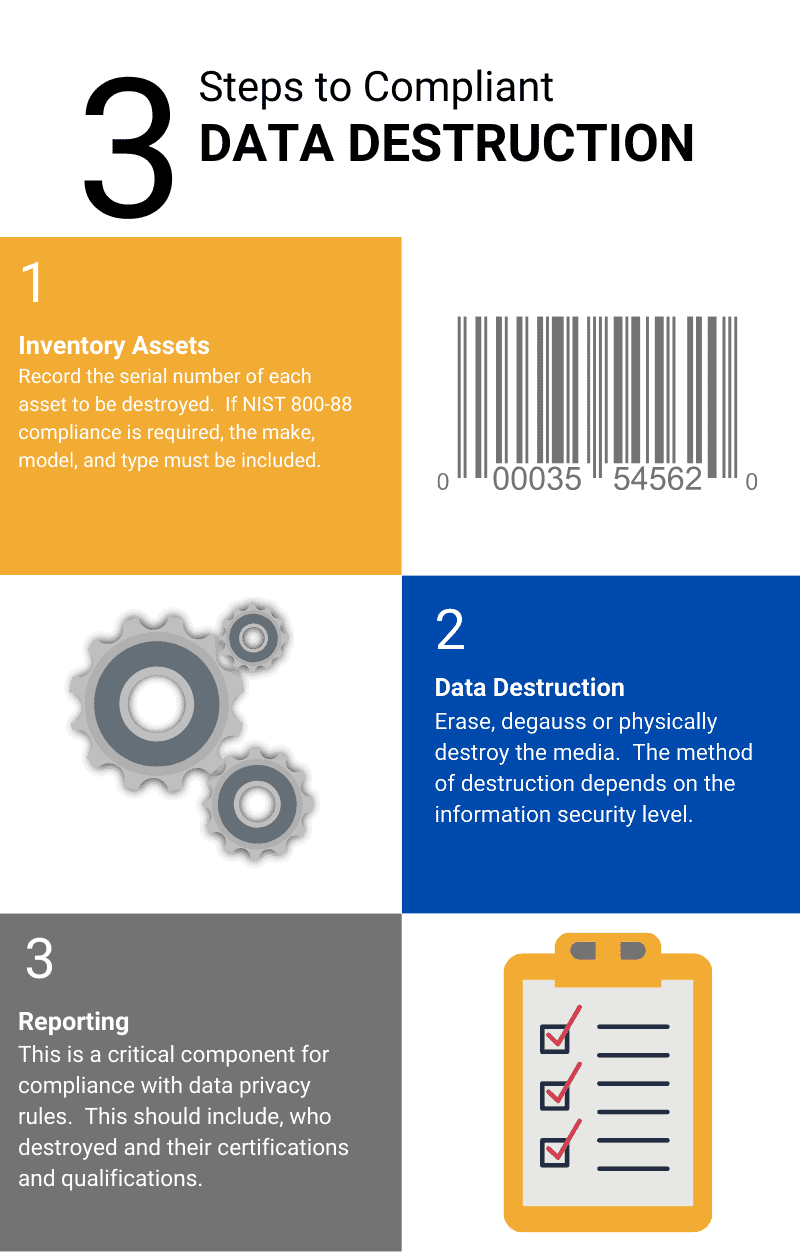How Robust Data Destruction Enhances Your Overall Cyber Security Measures
How Robust Data Destruction Enhances Your Overall Cyber Security Measures
Blog Article
The Important Nature of Information Devastation in Upholding Computer Safety Services and Protecting Against Unauthorized Accessibility
In an era where information breaches and identity burglary are significantly common, the relevance of reliable information devastation can not be overstated. Organizations has to acknowledge that the failure to effectively take care of delicate info poses not only legal and financial risks yet additionally a potential erosion of customer depend on. Different techniques, from data cleaning to physical devastation, serve as important safeguards versus unauthorized gain access to. Understanding the effects of information damage techniques and compliance with laws increases vital inquiries about the adequacy of present approaches and their long-lasting viability in the face of evolving dangers.
Value of Information Devastation
In an increasingly digital globe, the value of information damage can not be overemphasized. As companies collect substantial quantities of sensitive information, the potential repercussions of falling short to effectively get rid of and manage of that data come to be significantly extreme. Data breaches, identification burglary, and business reconnaissance present significant threats, emphasizing the requirement of effective information devastation techniques.

Moreover, as modern technology advances, so also do the approaches whereby harmful stars seek to make use of delicate information. Organizations should continue to be positive and vigilant in their information devastation techniques to protect versus these advancing threats. By prioritizing information destruction, firms not just shield their possessions however also foster trust fund amongst clients and stakeholders, showing a commitment to liable information management and safety and security techniques.
Approaches of Effective Information Destruction
To ensure the irreparable and full devastation of sensitive data, organizations can utilize a range of reliable approaches customized to their specific needs. One of the most common methods is data cleaning, which entails making use of specialized software to overwrite existing information numerous times, making recuperation basically difficult. This is specifically valuable for solid-state drives and tough drives, where standard deletion techniques are inadequate.
Another effective technique is degaussing, which utilizes solid magnetic areas to disrupt the magnetic domain names on storage media, rendering the information irretrievable. This technique is especially matched for magnetic storage tools, such as tape drives and hard disks.
Physical destruction is also a viable alternative, including the shredding, squashing, or incineration of storage tools. This approach warranties that information can not be recuperated, making it ideal for organizations handling very sensitive information.

Compliance With Data Defense Laws
Organizations need to not just concentrate on reliable information destruction methods but also make sure conformity with information protection guidelines that control how delicate information is managed and gotten rid of. Sticking to these regulations is important for securing individual information and keeping consumer trust. Regulations such as the General Information Defense Regulation (GDPR) in the European Union and the Health Insurance Portability and Accountability Act (HIPAA) in the United States impose strict standards on information monitoring, that include needs for the safe disposal of delicate info.
To accomplish compliance, organizations must implement comprehensive data destruction plans that straighten with these legal frameworks. This includes identifying data that requires destruction, establishing methods for safe methodsâEUR" such as shredding physical media or utilizing software application that satisfies industry standards for information wipingâEUR" and preserving comprehensive records of destruction tasks. Routine audits ought to be performed to make certain adherence to these policies and to identify any kind of prospective areas for renovation.
Failing to conform with data defense guidelines can result in significant lawful ramifications, consisting of large fines and damages to an organization's reputation. Consequently, integrating conformity into information damage practices is not just a legal commitment however additionally a critical element of a robust info security method.
Consequences of Poor Information Handling
Poor data handling can result in serious repercussions that expand beyond immediate operational problems. Organizations might deal with substantial financial losses because of data violations, which frequently lead to costly removal initiatives, legal costs, and governing fines. These financial ramifications can hinder and strain resources growth, eventually influencing a company's profits.
Moreover, bad data handling can drastically damage an organization's reputation. Clients, stakeholders, and partners might lose count on an entity that stops working to secure delicate info, causing reduced client loyalty and potential loss of business opportunities. This disintegration of trust can take years to rebuild, if it can be restored at all.
Additionally, organizations could face legal ramifications emerging from non-compliance with information defense policies. Such violations may result in examinations and penalties, compounding the monetary burden and more staining the company's image.
In the realm of cybersecurity, insufficient data management practices can create susceptabilities that make systems more vulnerable to unauthorized access and cyberattacks. Inevitably, these consequences emphasize the important importance of carrying out durable data managing procedures to safeguard delicate information and keep organizational integrity.
Best Practices for Secure Data Disposal


First of all, data need to be categorized according to its sensitivity. Sensitive information calls for much more rigorous disposal methods, such as shredding physical records and using advanced software program for digital information cleaning. Utilizing qualified information destruction services guarantees compliance with read this industry guidelines and see page requirements.
Secondly, organizations ought to apply a data disposal plan that mandates routine audits. This plan should describe the treatments for information retention and devastation, making sure that out-of-date information is gotten rid of quickly and securely. Training staff members on these protocols is necessary to cultivating a society of safety understanding.
Lastly, preserving detailed records of disposed data improves liability and gives a clear audit path. This documents should include the kind of information destroyed, the technique made use of, and the date of disposal.
Verdict
Finally, the imperative of efficient information destruction is evident in its role in improving computer protection services and mitigating unauthorized accessibility threats. Taking on robust techniques such as information cleaning, degaussing, and physical devastation, alongside conformity with policies like GDPR and HIPAA, is necessary for guarding delicate information. Overlooking correct information disposal practices can cause extreme repercussions, consisting of data breaches and lawful repercussions. Implementing finest methods in safe data disposal inevitably fortifies business honesty and customer depend on.
In an age where information violations and identity theft are progressively prevalent, the importance of reliable information damage can not be overstated. data destruction. Information violations, identity theft, and business reconnaissance pose substantial threats, highlighting the necessity of reliable information damage practices
Compliance with laws such as GDPR and click here now HIPAA requireds that companies carry out rigorous information defense measures, consisting of the safe and secure devastation of data at the end of its lifecycle.
By focusing on information damage, business not only protect their properties yet additionally foster count on amongst clients and stakeholders, demonstrating a dedication to liable data management and safety methods.
Organizations should not only focus on reliable information devastation approaches yet additionally guarantee compliance with information protection regulations that regulate just how sensitive info is managed and disposed of.
Report this page